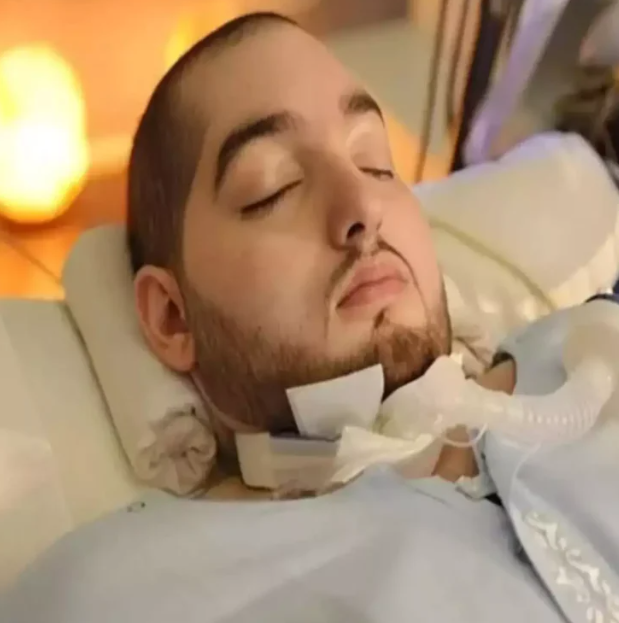
“Saudi’s Sleeping Prince” Reportedly Wakes Up After 20 Years in Coma, Stirring a Storm of Hope and Mystery
The Kingdom of Saudi Arabia has been thrown into a swirl of hope, disbelief, and quiet celebration following unconfirmed reports that Prince Al-Waleed bin Khaled bin Talal—dubbed “The Sleeping Prince”—has miraculously woken up after spending two decades in a coma. The news, first circulated on various online platforms, suggests that
The Kingdom of Saudi Arabia has been thrown into a swirl of hope, disbelief, and quiet celebration following unconfirmed reports that Prince Al-Waleed bin Khaled bin Talal—dubbed “The Sleeping Prince”—has miraculously woken up after spending two decades in a coma. The news, first circulated on various online platforms, suggests that the prince, who has been unconscious since a devastating car crash in 2005, may have finally opened his eyes to the world after twenty long years of silence.
Prince Al-Waleed, the son of billionaire royal Prince Khaled bin Talal Al Saud, suffered a traumatic brain injury while studying at a military college in the United Kingdom. The car crash left him in a deep coma and led to a lengthy, seemingly unending stretch of life on medical support. Since the incident, the prince has remained under intensive care at King Abdulaziz Medical City in Riyadh, with a feeding tube as his lifeline and a team of specialists monitoring his every breath.
His story has, over the years, become a symbol of both unwavering familial faith and the fine line between life and death. Despite being advised by medical professionals in 2015 to consider pulling the plug on his son’s life support, Prince Khaled stood firm in his belief that his son would someday recover. His response to the suggestion was both spiritual and poignant: “If God wanted him to die in the accident, he would have already been buried.” That statement echoed across the Arab world and beyond, encapsulating a father’s undying hope against overwhelming odds.
Over time, there have been flickers of progress—moments when the prince would slightly move a finger or twitch his head—but none of these signs amounted to a conclusive turn toward recovery. In 2019, the family reported minimal responsiveness that ignited hope but faded with no subsequent progress. As months turned into years, and years into decades, many began to lose hope, though the prince’s family continued to remain faithful and committed to his care.
Now, in 2025, a year marking two full decades since that tragic accident, the whispers of a miracle have started to gain traction. Online platforms, social media posts, and viral videos claim that the prince has woken up. Some posts suggest he opened his eyes. Others claim more—gestures, slight vocalizations, or facial movements. Yet, despite the storm of excitement sweeping across digital platforms, the royal family has neither confirmed nor denied these reports, leaving a vacuum of official communication that only fuels the speculation further.
The public response has been overwhelming. Hashtags like #SleepingPrince and #AlWaleedAwakens have started trending across various platforms including X (formerly Twitter), Instagram, and TikTok. Messages of congratulations, prayers, and hope have poured in from across the Middle East and beyond. In some quarters, religious interpretations are being applied to what many consider a divine intervention—a miracle in the truest sense.
Skeptics, however, are urging caution. Without a formal statement from the family or the hospital, the authenticity of these reports remains questionable. Medical experts have also weighed in, suggesting that in extremely rare cases, patients have been known to regain consciousness after long-term comas, though the quality of life post-revival can vary drastically. Neurologists cite the immense toll such a long coma would take on the body and brain, making full recovery unlikely—but not entirely impossible.
What makes this case particularly unique is the emotional narrative that has followed the prince throughout his coma. Prince Khaled bin Talal, known for his philanthropy and political outspokenness, has transformed his son’s plight into a deeply human story that has resonated with millions. Regular updates, rare photos, and video clips from the hospital bed have kept the story alive. Occasionally, those glimpses have provided comfort and inspiration to families going through similar tragedies.
The silence from official Saudi media outlets and government channels is deafening, yet not entirely surprising. The royal family often prefers discretion over publicity when it comes to personal matters, especially those involving health. In the absence of a formal statement, speculation has continued to fill the air. Some observers believe the family is awaiting further medical evaluation before making a public announcement. Others theorize that the news may have leaked prematurely, with insiders jumping the gun on what could still be an early stage of responsiveness.
Still, the sheer possibility that Prince Al-Waleed could be regaining consciousness after two decades has lit a fire of inspiration around the world. Families of coma patients are holding onto this story as a beacon of hope, a reason to believe that the impossible can happen. Religious communities are praising the persistence and devotion shown by his family, especially his father, who chose faith over finality.
Whether or not the prince has truly awakened, this development is a stark reminder of how unpredictable life can be. It underscores the fragile boundary between medical science and miracles, between what doctors believe is final and what faith insists is not over. The story of the Sleeping Prince has, for years, been one of patience, loyalty, and quiet resilience. Now, with the new wave of reports suggesting a possible return to consciousness, the world is watching once more—with bated breath.
In a time when headlines are often dominated by conflict, crisis, and cynicism, the story of Prince Al-Waleed bin Khaled offers a rare glimpse of enduring hope. Whether confirmed or not, the narrative continues to evolve, capturing hearts and sparking debate. And if it turns out to be true—that after 20 years, the Sleeping Prince has opened his eyes—the tale will not just be one of medical astonishment, but one of love, belief, and the human spirit’s unbreakable will to hold on.
Share this post
Related Posts

Terror in Bokungi: Two Abducted Rice Farmers Reportedly Killed as Tension Grips Kwara Community
Tension has enveloped the quiet farming community of Bokungi Village in Edu Local Government Area...

“₦2k Airtime, ‘Come Over’ Demands and the Dating Dilemma: Lady’s Viral Rant Ignites Debate on Modern Romance in Nigeria
A Nigerian woman’s candid outburst about a recent encounter with a potential suitor has ignited...

SAKA SAYS “FOREVER”: ARSENAL STAR PROPOSES TO LONGTIME LOVE TOLAMI BENSON IN LUXURY LONDON FAIRYTALE
Bukayo Saka, one of England’s brightest football talents and a fan favourite at Arsenal, has...